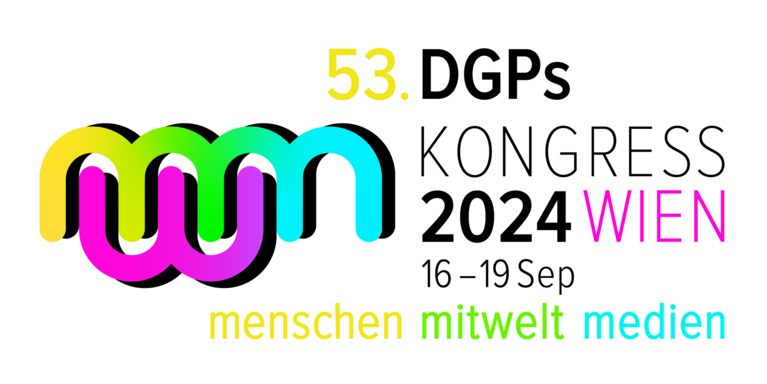Code of Conduct for the DGPs Congress 2024, Vienna
The organizing team of the Congress of the German Psychological Society (DGPs Congress) is committed to respecting and promoting diversity, equality, inclusion, and freedom of expression. We strive to create a productive, safe, and harassment-free environment for all participants. By participating in the congress (whether as a speaker, guest, or member of the organizing team), you agree to the following Code of Conduct.
All forms of disrespectful behavior, including specifically all forms of discrimination, are not welcome. To determine whether disrespectful behavior is present in a specific situation, it can be helpful to consider the concept of structural discrimination, as disrespectful actions often manifest as forms of structural discrimination (cf. www.humanrightswatch.ch). Structural discrimination manifests at individual, cultural, and institutional levels and pertains, among other things, to the diversity categories listed below.
Specifically, the following behaviors (physical or virtual) are considered undesirable:
- Harassment or intimidation based on (attributed) diversity categories such as age; biological, psychological, or social gender; geographical, cultural, or ethno-linguistic characteristics; political views; physical appearance; mental or physical disabilities; religion or secularity; sexual orientation; socio-economic status; or the intersection of several of these characteristics.
- Derogatory verbal or written expressions relating to the aforementioned categories that create a hostile environment (e.g., sexist or racist jokes).
- Sexual harassment or intimidation, including unwanted sexual attention and unwanted physical contact.
- Patterns of inappropriate or intrusive social contact, such as demanding or accepting inappropriate intimacy or continuing personal conversations after being asked to stop.
- Unwanted photography, audio or video recording, stalking, or pursuit.
- Threatening or inciting violence against a person, including encouraging self-harm.
- Public disclosure of aspects of a person's identity or (attributed) group affiliation against their will (e.g., outing of sexual orientation) or the use of names or designations for a person that they reject (e.g., deadnaming, misgendering).
- Persistent disruption of speakers or events (verbal or physical).
- Unwanted comments on a person's lifestyle and practices, including those related to nutrition, health, education, and employment.
- Retaliation against a person who has reported harassment or other unacceptable behavior or has participated in an investigation of such an accusation.
- Advocating or encouraging any of the aforementioned behaviors.
This Code of Conduct aims to ensure conditions for open and respectful scientific research and communication. Critical examination, discussion, and strong disagreements regarding beliefs and viewpoints relevant to the topic of discussion, presented in a respectful manner, do not in themselves constitute harassment.
We expect all individuals involved in the DGPs Congress to adhere to this Code of Conduct in all matters related to the congress.
Consequences
All individuals involved in the DGPs Congress are encouraged to look out for each other and intervene if they observe the aforementioned behaviors. When asked to cease harassing behavior, a person is expected to comply immediately. The congress organizing team reserves the right to take various measures to ensure compliance with the Code of Conduct. These measures may include addressing the individuals involved, expulsion from the congress without refund, requesting exclusion from future DGPs events, requesting cancellation of DGPs membership, and filing a police report.
Reporting and Assistance in Incidents
If you or someone in your vicinity experiences or suspects disrespectful or intrusive behavior at the congress, please report it to a member of the DGPs Congress Organizing Committee. You can make a report in person, send it to dgps2024@univie.ac.at, or make an anonymous report through our anonymous online form on this website. All reports will be forwarded to the Code of Conduct Committee, which will then decide on appropriate measures.
We respect requests for confidential handling of a report if it serves the protection of an abuse victim. If there are security concerns, we reserve the right to publicly identify a person accused of harassment or privately warn individuals about them. We do not disclose the names of harassment victims without their explicit consent.
If you believe you have been falsely accused of violating this code of conduct, please notify the Code of Conduct Committee with a brief description of your perspective (dgps2024@univie.ac.at). Appeals against these measures will be decided by the board.
Conflicts of Interest
Members of the Code of Conduct Committee and any other individuals responsible for implementing or monitoring these measures will recuse themselves if they have a conflict of interest, such as being a specific target of harassment or a suspected harasser, or having a close personal or professional relationship with an affected or accused person.
Feedback
We look forward to working together to create a safe, pleasant, and respectful atmosphere for professional and critical scientific exchange. We welcome feedback on this code of conduct or any other aspects of addressing diversity and discrimination at the conference via dgps2024@univie.ac.at.
Sources
We would especially like to thank Prof. Dr. Sören Krach, Professor at the University of Lübeck, the Speaker of the Diversity, Equity, and Inclusion Commission of the DGPs, and Dr. Nicole Cruz, Postdoctoral Researcher at the University of Innsbruck for their invaluable work in the development of this Code of Conduct.
This code of conduct has been adapted and inspired by the following sources:
- Complex Human Data Summer School 2018, University of Melbourne, Australia: https://djnavarro.net/chdss2018/coc.html
- Human Rights Watch Switzerland: https://www.humanrights.ch/de/ipf/menschenrechte/diskriminierung/diskriminierungsverbot-dossier/juristisches-konzept/formen-der-diskriminierung/
- R-Ladies: https://www.rladies.org/coc/
- Society for Mathematical Psychology: https://mathpsych.org/page/code-of-conduct
- Society for the Improvement of Psychological Science (SIPS): https://improvingpsych.org/sipsinaction/code/
For more detailed information on creating and implementing a code of conduct, see:
- The Ada Initiative: https://adainitiative.org/continue-our-work/conference-policies/
- "A Quick Guide to Creating a Code of Conduct" by Frameshift Consulting: https://files.frameshiftconsulting.com/books/cocguide.pdf
